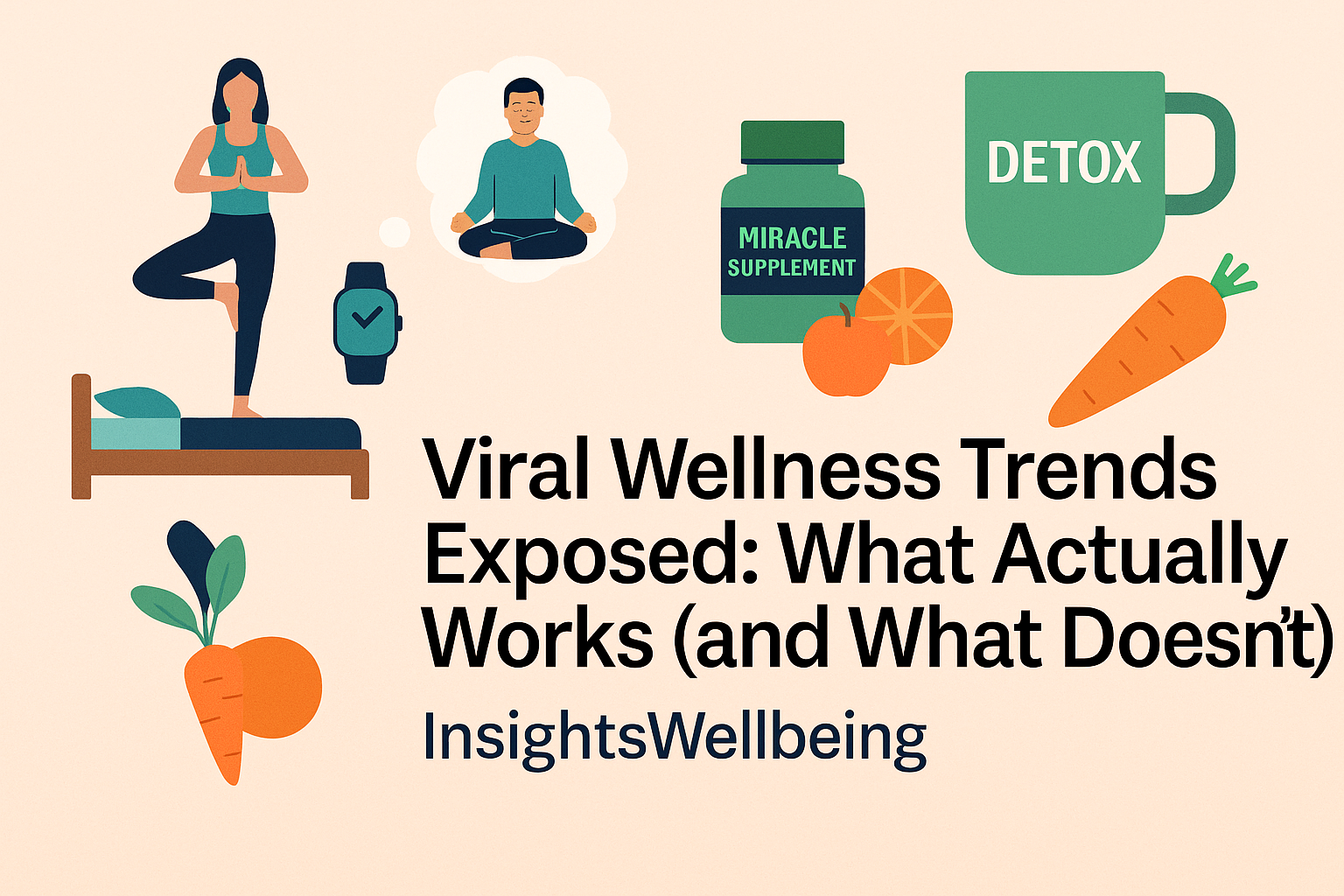Viral Wellness Trends Exposed: What Actually Works (and What Doesn’t) | InsightsWellbeing

Introduction
Everywhere you look online, someone is promising a quick fix to feel happier, healthier, or more productive. From detox teas and fasting hacks to energy crystals and sleep gadgets, the wellness world is booming. But how much of it actually works? And how much is just clever marketing?
At InsightsWellbeing, we believe in separating the hype from the helpful. This guide dives into popular wellness trends, explores what science really says, and offers practical, everyday strategies that genuinely support your mental and physical health.
Whether you’re curious about trying a new wellness routine or just want to scroll more mindfully, this article is for you.
Why Trending Wellness Can Be Misleading
Social media makes trends go viral overnight. But just because a wellness hack has thousands of likes doesn’t mean it’s effective or safe. Many trends focus on quick results, aesthetic appeal, or feel-good messaging, rather than science-backed benefits.
- Marketing vs. Evidence: A lot of trends are pushed by influencers or brands with a product to sell.
- Personal differences matter: What works for one person might not work for another.
- Short-term results: Some trends give quick boosts (like caffeine or cold showers) but don’t support long-term health.
Popular Trends That Actually Work
Even in the noise, some trends have real benefits. These aren’t magic solutions, but they can support your wellbeing when done mindfully.
1. Mindful Movement
Yoga, Pilates, tai chi, and even simple stretching are popular for good reason. Studies show these activities improve mental health, flexibility, and stress resilience.
- Why it works: Mindful movement combines physical activity with breath awareness and focus.
- Tip: Consistency matters more than intensity. Even 15–20 minutes daily helps.
External Reference: Harvard Health – The Health Benefits of Yoga
2. Sleep Hygiene Practices
Sleep trackers, weighted blankets, and bedtime routines have gone viral. Good sleep isn’t just trendy—it’s essential.
- Why it works: Consistent sleep supports mood, cognitive function, and immunity.
- Tip: Keep screens out of the bedroom, maintain a consistent schedule, and try relaxing pre-sleep rituals.
External Reference: National Sleep Foundation – Healthy Sleep Tips
3. Meditation & Mindfulness
From apps to guided videos, meditation is everywhere. Research confirms mindfulness reduces stress, anxiety, and overthinking, and even improves focus.
- Tip: Start with short sessions (5–10 minutes) and gradually increase. Focus on breath or body sensations rather than forcing thoughts to stop.
External Reference: APA – Mindfulness Meditation
Trends That Don’t Live Up to the Hype
Some wellness fads promise big results but lack scientific support—or can even backfire.
1. Detox Teas and Cleanses
Claims of “flushing toxins” or rapid weight loss are largely unproven. In some cases, excessive detoxing can cause dehydration or nutrient loss.
- Better alternative: Support liver and kidney health naturally through balanced nutrition and hydration.
2. Extreme Diet Fads
Keto, juice cleanses, and zero-carb trends may work short-term for some, but can stress your body and affect mental health if not done carefully.
- Better alternative: Aim for balanced meals with whole foods, proteins, fiber, and healthy fats.
3. Miracle Supplements
Crystals, “adaptogen powders,” or exotic herbs often go viral for anxiety, focus, or energy. Evidence is limited, and some supplements interact with medications.
- Better alternative: Focus on nutrition, exercise, and mental health support for sustainable energy and wellbeing.
How to Approach Wellness Trends Safely
- Check the science: Look for peer-reviewed studies or expert recommendations.
- Start small: Try trends in moderation before fully committing.
- Listen to your body: Everyone is different; what feels good for one person might not work for another.
- Prioritize fundamentals: Sleep, nutrition, movement, hydration, and mental health matter most.
Conclusion
Wellness trends can be fun and inspiring, but not all are effective—or safe. Mindful movement, sleep hygiene, and meditation are examples of trends backed by science. Detox teas, extreme diets, and miracle supplements, on the other hand, deserve caution.
At InsightsWellbeing, we encourage a balanced, evidence-informed approach to wellness. Instead of chasing every viral trend, focus on what genuinely improves your mental and physical health.
If you’re unsure where to start, an exploratory call with our team can help you identify the habits and practices that suit your lifestyle and goals.
FAQs
Q1. Are all wellness trends useless?
No. Some trends, like yoga, mindfulness, and good sleep practices, are backed by science and can support wellbeing.
Q2. How do I know if a trend is safe?
Check for peer-reviewed studies, expert opinions, and avoid extreme diets, unregulated supplements, or rapid detox claims.
Q3. Can trying viral trends hurt my mental health?
Yes, if they create stress, guilt, or unrealistic expectations. Focus on trends that fit your body, lifestyle, and mental health needs.
Q4. How long before I see benefits from trends like meditation or yoga?
Even 10–15 minutes daily for a few weeks can improve mood, focus, and stress resilience.
Q5. Can I combine trends with therapy or care plans?
Absolutely. Integrating safe wellness practices with InsightsWellbeing’s Services or Care Plans (like Growth and Guidance Plan) enhances overall wellbeing.
References
- Harvard Health. The Health Benefits of Yoga. https://www.health.harvard.edu/staying-healthy/the-health-benefits-of-yoga
- National Sleep Foundation. Healthy Sleep Tips. https://www.sleepfoundation.org/sleep-hygiene
- American Psychological Association. Mindfulness Meditation.https://www.apa.org/topics/mindfulness
- PubMed Central. Social Media Use and Body Image in Adolescents.https://www.ncbi.nlm.nih.gov/pmc/articles/PMC8701501/

Priya Parwani
Priya is dedicated to providing practical solutions with an evidence-based approach to mental health care.
Related Blogs
No related blogs available.
